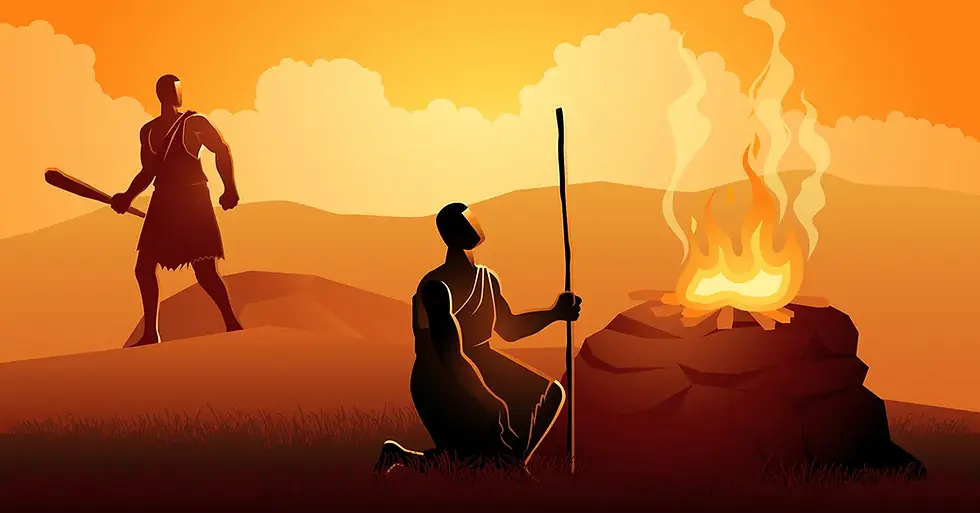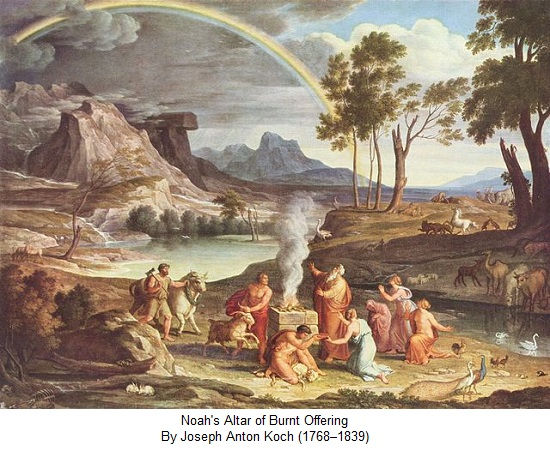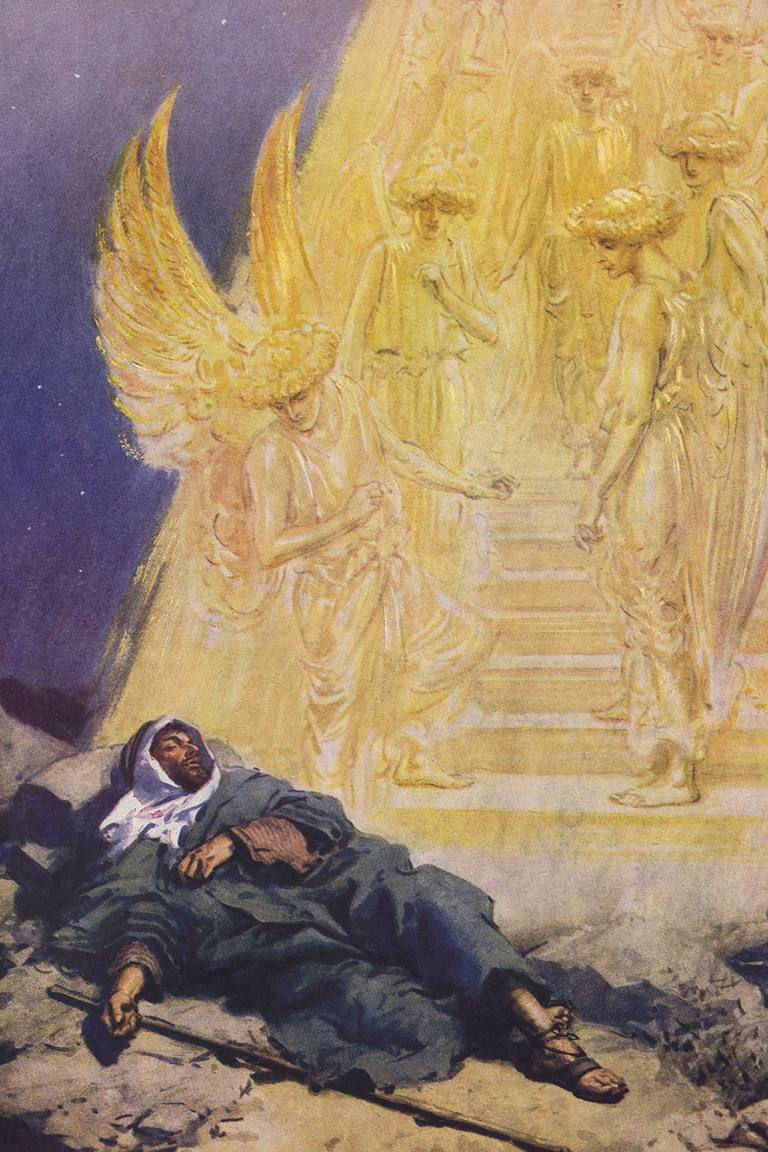Sunday School Overview: Sacred Altars and Holy Gifts
- Feature

- May 29
- 4 min read
By Rev. Adrian Grubbs
Unit 1: The Genesis of Altars and Sacrifices
Worship in the Old Testament often involved offering sacrifices. We begin the summer quarter with five examples of early sacrifices in Genesis – Cain and Able, Noah, Abraham, Isaac, and Jacob.

Why did Yahweh not accept Cain’s offering (Genesis 4)? It could not have been because God did not approve of grain or vegetable offerings (see Leviticus 2). Cain and Abel, the sons of Adam and Eve, brought offerings of love and gratitude to the LORD. Cain, a farmer, brought of his produce from the ground; and Abel, a shepherd, brought a firstborn lamb from his flock. We are not told explicitly why Yahweh accepted Abel’s offering but did not approve of Cain’s gift, but the text does offer some hints from Cain’s reaction and the LORD’s questions. First of all, Cain became very angry and his countenance fell, literally, “his face fell” –he was terribly ashamed. Secondly, he led Abel out into the fields and killed him. T
Thirdly, when questioned by Yahweh, he denied any responsibility or concern for his brother. The LORD asked three questions in verses 6, 9, and 10: Why are you angry and ashamed? Where is your brother? What have you done? Yahweh suggested that if he does good, he and his offering would be accepted, but that he had to take control over sin instead of allowing sin to control him. The problem with Cain’s offering seems to be, not with the sacrifice, but with the heart of the one offering the sacrifice. Incidentally, Cain did not receive the death penalty for killing his brother, just as Adam and Eve did not die for their rebellion. God is more about redemption than retribution.

The first thing Noah did when he stepped off the ark was to build an altar and make burnt offerings to Yahweh (Genesis 8). When the world was created God designed everything to work in harmony and be productive. God had declared in Genesis 1:31 that all He had made was very good. But Adam and Eve ate the forbidden fruit, then Cain killed his brother, and, by time we come to Genesis 6, because of human wickedness the earth had become corrupt and was filled with violence. So, God decided to undo His creation and destroy it all with a flood. But Noah found grace in the eyes of the LORD (6:8). Noah built an ark according to the specifications of the Architect; then the flood came. For 40 days it rained, and the deluge continued for 150 days. Then, as at creation, God’s wind, or breath, blew across the troubled waters. When the waters had receded and the land was dry, the door was opened and Noah built an altar to Yahweh. On the altar he offered burnt offerings of thanksgiving and praise to the LORD. On that day God made a covenant with Noah, his descendants, and every living creature to never again destroy the world in a flood. This covenant is mentioned six times (9:9, 11, 13, 15, 16, 17), and the rainbow was given as a sign. In 8:21 some English translations say that the LORD “cursed” the ground because of humans, but it is not the same Hebrew word for “curse” that is used in 3:17; more properly it should read that Yahweh would never again “despise the ground because of human inclination to evil.”
It had been a long, taxing journey for A braham and Sarah. The LORD had promised them a son; Abraham and Sarah had stumbled several times, but, finally, after 25 years, it had all worked out – they had a son, and all was going well. Then the LORD decided to test Abraham. Some translations say “tempt” – the Hebrew can be translated either way; “tempt” has more of a negative connotation suggesting that the purpose was to cause one to stumble, whereas, the purpose for “test” is to challenge one to pass. When Isaac was about twelve years old, supposedly, the LORD commanded Abraham to sacrifice as a burnt offering his “son,” his only son,” the son he “loves” (Genesis 22:2). Does that bring to mind John 3:16? And verse 4 speaks of “on the third day” – where else in Scripture is “on the third day” important? Is it significant that three times Abraham says, “Here I am”? Abraham passed the test. He and Isaac carried wood and fire to Mount Moriah, a three days journey, built an altar, and at the very moment Abraham was about to slaughter Isaac for sacrifice, he was stopped by the angel. A ram, caught in the thicket, became the burnt offering instead of Isaac.
Years later, it was Isaac’s turn to build an altar to Yahweh. Genesis 26 is five brief stories about Isaac, with four references to the LORD blessing him, and the LORD twice assuring Isaac of his place in the Abrahamic covenant. Verse 25 says that at Beersheba he 1) built an altar, 2) called on the name of Yahweh, 3) pitched his tent, and 4) dug a well.

In Genesis 28 Jacob, son of Isaac, fleeing from his brother’s murderous threats, spent the night at a place that he called Bethel. He dreamed of a highway [stairs, ladder, ramp] from earth to heaven, with angels going up and down – in the Bible angels do not have wings, so they were walking. In the dream Yahweh spoke to Jacob, including him in the covenant with Abraham and Isaac. Jacob set upright the stone he used for a pillow, consecrated it with oil, and named the place Bethel, the House of God. The pillow for his head became a pilar for a memorial. In Genesis 33, after a surprisingly joyful reunion with his brother Esau, Jacob built an altar to “El-Elohe-Israel” [God, the God of Israel]. And in Genesis 35, after fourteen years living with Laban, his uncle and father-in-law, Jacob returned to Bethel where Yahweh had first appeared to him. There he erected an altar to God. Nothing is said about sacrifices, but that was the purpose for altars.
These are some of the early altars and sacrifices before Moses, the tabernacle, and the temple. In the Old Testament worshipping God involved altars and sacrifices.




Comments